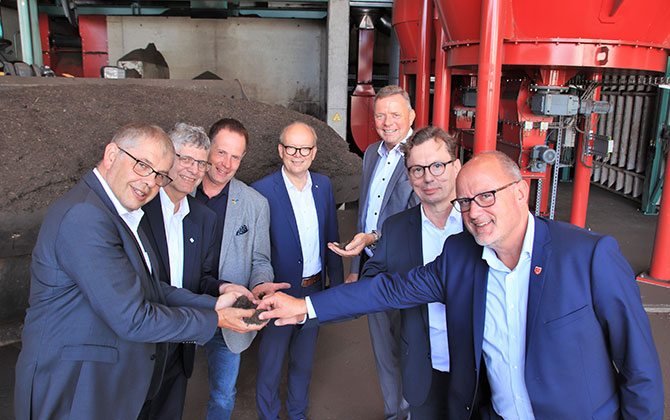KOMPOTEC composting plant in Nieheim will be upgraded to an energy plant
The composting plant located in Nieheim, Germany, will be expanded. With an extensive set of measures and the largest investment in the history of KOMPOTEC, the plant is going to make a significant contribution to the future energy supply through biomethane from organic waste and electricity from wind and PV systems. For this reason, an on-site meeting led by the Prime Minister of North Rhine-Westphalia, André Kuper, took place on September 12, 2022. The delegation included following participants: Christian Haase, member of the Parliament, Matthias Goeken and Klaus Hansen, members of the State Parliament of North Rhine-Westphalia, Heinz-Günter Koßmann, Chairman of the Regional Council of the Höxter district as well as Nieheim's Mayor, Johannes Schlütz.
Nieheim, Germany. The production of biomethane from organic waste is widely discussed due to the current uncertain energy supply situation. Baden-Württemberg, for example, has decided, in the future, to use organic waste only for fermentation. The NRW coalition agreement between the CDU and the Greens also stated that there should be an increased use of residual materials for energy production.
Since its commissioning in 1961, the composting plant at the Nieheim site, has been expanded several times and optimized, to meet the constantly increasing environmental requirements and quality specifications. The plant operators at KOMPOTEC Nieheim recognized early on the enormous potential of fermentation, so that a partial conversion of the plant was carried out in 2006 with the help of a proprietary process, specially developed for the energetic use of organic waste. Since then, with a total plant throughput of 98,500 tons per year, around 3.4 million cubic meters of biogas have been produced annually from a partial quantity of 24,000 tons of biowaste and converted into electricity via a CHP unit.
The short-term measures for the currently planned plant upgrade include the expansion of the total plant capacity to 108,000 tons per year and the construction of a biogas plant with improved efficiency for 84,000 tons of bio waste per year. In the new biogas upgrading plant, annually 10.5 million cubic meters of biogas will be upgraded to 5.7 million cubic meters of biomethane in natural gas quality and fed into the natural gas grid. For comparison: The natural gas required to heat a 100 m² apartment in an old building, is around 2,000 m³ of natural gas per year. This means, that the equivalent of 2,850 apartments in old buildings or around 10,000 well-insulated apartments can be heated with the biomethane from Nieheim.
Included in the plant expansion project, there’s also the construction of two liquid fertiliser storage facilities, each with a volume of 6,000 m³, and the construction of a logistics and storage hall.
The existing photovoltaic system will be used to supply power to the existing and new process technology, and a wind turbine will be built directly on site. In the end, the entire plant will be self-sufficiently supplied with electricity and, in addition, a surplus of 6 million kWh of green electricity per year will be fed into the public grid. That is enough to supply another 2,000 households with electricity.
All of these measures will not only ensure high-quality waste treatment, but will also contribute to conservation of resources (production of organic complete fertilizer and peat substitute) and, at the meantime, will provide an important building block for energy independence. After implementation of the planned expansion measures, the plant in Nieheim will be the largest plant for the production of biomethane from organic waste in Germany.
“With this showcase project, we are sending a clear signal for sustainability in every respect. By facing up to these challenges at an early stage, we can make an enormous contribution to the energy transition,” explains Karlgünter Eggersmann, Managing Director of the Eggersmann Group.
The expansion of the plant is being carried out in cooperation between KOMPOTEC Kompostierungsanlagen GmbH, Eggersmann Anlagenbau GmbH and Fechtelkord und Eggersmann GmbH. All three companies are part of the Eggersmann Group.
